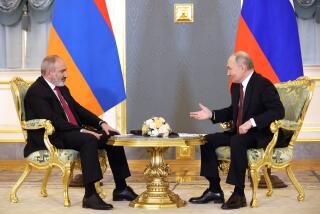Russia, Israel Plan Stronger Ties, Rabin Says
- Share via
MOSCOW — Wrapping up the first visit to Russia by an Israeli prime minister, Yitzhak Rabin emerged from talks with Kremlin leaders Tuesday saying he is convinced that Moscow is working constructively toward peace in the Middle East.
Closing the book on more than 40 years of hostility between the former Soviet Union and the Jewish state, Rabin said Israel and Russia expect to strengthen their ties in everything from trade to military cooperation. Plans include a visit to Israel by Russian Defense Minister Pavel S. Grachev.
Rabin, whose visit was prompted in part by signs that Moscow is seeking a more active Middle East role, stressed that he has the Kremlin’s agreement that neither Russia nor the United States should meddle in Israeli-Palestinian peace talks now under way.
“The understanding, I believe, on the part of Russia, as well as on the part of the United States, is to leave the negotiations to be done between us and the representatives of the PLO in Cairo,” Rabin told reporters.
His trip to Moscow followed a visit last week by Palestine Liberation Organization leader Yasser Arafat--who, like Rabin, acquainted Russian leaders with his views on the snags in the talks.
Russia and the United States co-sponsored the Mideast peace process launched in Madrid in 1991, but Moscow took a clear back seat to Washington at that point.
In recent months, Foreign Minister Andrei V. Kozyrev has been pushing to make Moscow’s foreign policy more assertive in general to steal the initiative from rising Russian ultranationalists.
As for Israel’s interest in Russia, Rabin emphasized mainly the possibilities for expanded trade, saying that an agreement on economic ties and free trade expected to be signed today is the most important of more than half a dozen concluded during his trip.
The warming of Israeli-Russian relations came in striking contrast to Moscow’s Cold War-era role of supporting the Arab nations against U.S.-backed Israel. The Soviet Union and Israel established diplomatic relations only in 1991, after a 24-year break.
More to Read
Sign up for Essential California
The most important California stories and recommendations in your inbox every morning.
You may occasionally receive promotional content from the Los Angeles Times.












